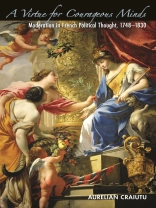Political moderation is the touchstone of democracy, which could not function without compromise and bargaining, yet it is one of the most understudied concepts in political theory. How can we explain this striking paradox? Why do we often underestimate the virtue of moderation? Seeking to answer these questions, A Virtue for Courageous Minds examines moderation in modern French political thought and sheds light on the French Revolution and its legacy.
Aurelian Craiutu begins with classical thinkers who extolled the virtues of a moderate approach to politics, such as Aristotle and Cicero. He then shows how Montesquieu inaugurated the modern rebirth of this tradition by laying the intellectual foundations for moderate government. Craiutu looks at important figures such as Jacques Necker, Madame de Staël, and Benjamin Constant, not only in the context of revolutionary France but throughout Europe. He traces how moderation evolves from an individual moral virtue into a set of institutional arrangements calculated to protect individual liberty, and he explores the deep affinity between political moderation and constitutional complexity. Craiutu demonstrates how moderation navigates between political extremes, and he challenges the common notion that moderation is an essentially conservative virtue, stressing instead its eclectic nature.
Drawing on a broad range of writings in political theory, the history of political thought, philosophy, and law, A Virtue for Courageous Minds reveals how the virtue of political moderation can address the profound complexities of the world today.
Despre autor
Aurelian Craiutu is professor of political science at Indiana University, Bloomington. His publications include
Liberalism under Siege: The Political Thought of the French Doctrinaires,
Tocqueville on America after 1840: Letters and Other Writings (edited and translated with Jeremy Jennings), and
America through European Eyes (edited with Jeffrey C. Issac). He has also edited the political works of François Guizot and Madame de Staël.












